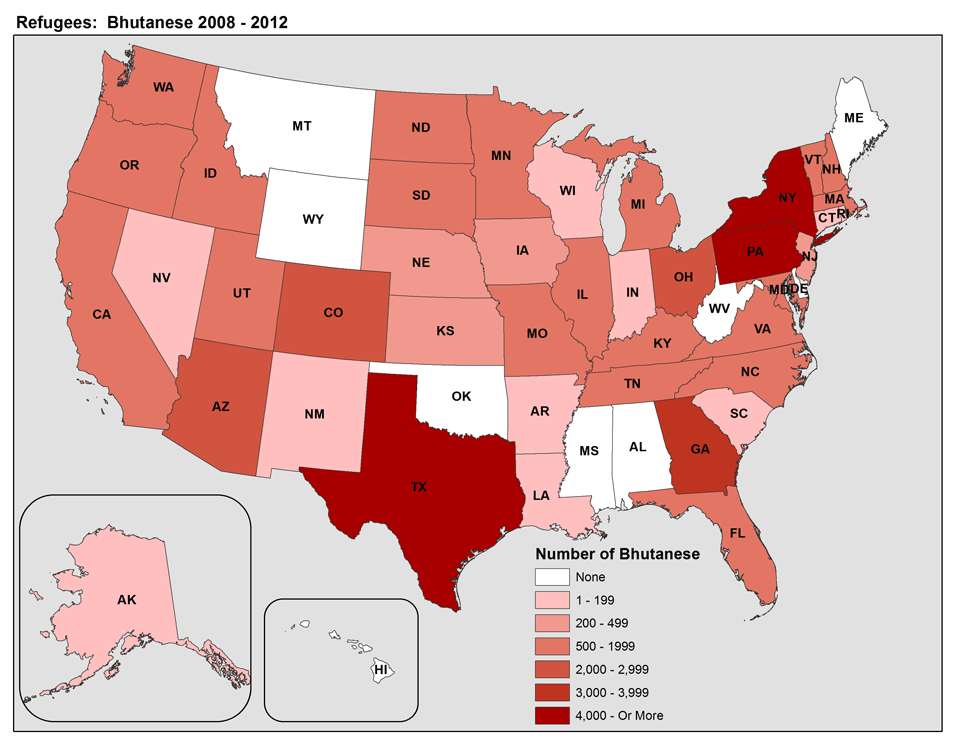Weren’t we told Obamacare was going to take care of all the poor uninsured people? I guess not according to this story, one more in a series, from reporter Erika Beras on refugees without health care and insurance in Pennsylvania. Beras’ other stories are here.
From New America Media (Hat tip: ‘pungentpeppers’). This is a long report but well worth reading. Is your refugee contractor going to help care for the uninsured or dump them (after the federal money runs out) on your state and city? On your local hospital?
Wyoming, are you ready for this?

http://www.cdc.gov/immigrantrefugeehealth/profiles/bhutanese/population-movements/
Just one of the featured refugees is Mira a Bhutanese refugee with lots of health problems and on a suicide watch.
Mira Chhetri knows all too well the perils of being uninsured. Chhetri, 23, came to the U.S. with her husband a couple years ago after spending most of her life in refugee camps in Nepal.
In her first few months here, she had ovarian cysts removed. The procedure was expensive, but like all of her health care needs at the time, it was covered by federal refugee medical assistance. [US taxpayer funded!—ed]
All refugees have health care coverage for the first eight months they are in the U.S. But when the eight months are over, if they don’t qualify for Medicaid or disability or have a job that provides them health care, they are at a loss.
“After eight months they are like any poor American, low-income American,” said Leslie Aizenman, who runs Refugee Services at Jewish Family and Children’s Services, one of the four local agencies tasked with acclimating new refugees to Pittsburgh.
After their medical assistance ended, Chhetri and her husband were uninsured. They both made just above minimum — too much to qualify for Medicaid. Chhetri still had pending surgeries.
Before you read this below, know that there is nothing that precludes a resettlement contractor from raising PRIVATE funds to help offset the medical costs of those it brings to your city.
The U.S. State Department issues guidelines for what the resettlement agencies have to provide refugees. But when it comes to health care, Aizenman said it’s open to interpretation.
“As regarding medical care there are three sentences about what we must do for newly arriving refugees,” she said.
The agencies must make sure refugees get an entry physical in the first 30 days, and they have to address acute medical issues.
In Pennsylvania, before 2009, there wasn’t even a standardized physical exam. Physicians generally just checked for tuberculosis, parasites and sexually transmitted diseases. They also made sure that refugees got immunizations. [Now that Pennsylvania gets so many refugees, they have stricter physical exam requirements.—ed]
Bhutanese refugees are committing suicide at alarmingly high rates (see our archive).
In Mira Chhetri’s case, in the last couple years, she and her husband have moved in and out of jobs, obtaining and losing health insurance along the way.
Along with her outstanding physical pain, in February, while she was uninsured, she attempted suicide. She spent a few days at Western Psychiatric Institute and Clinic. Then, she received a bill for more than $8,000 in care.
Before yours becomes a “welcoming” resettlement city, get all the facts about what the ‘diversity’ is going to cost you!
